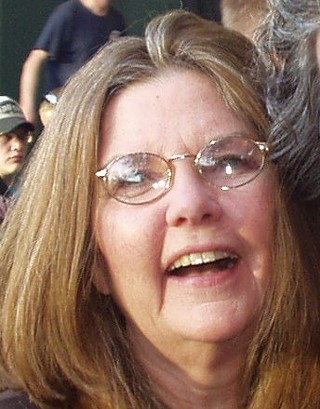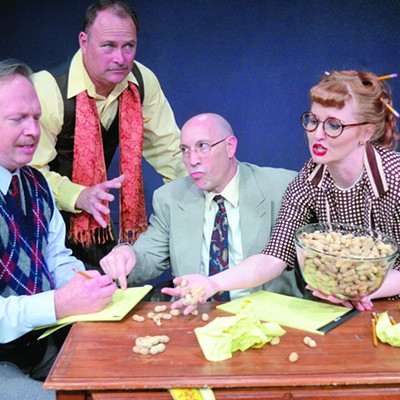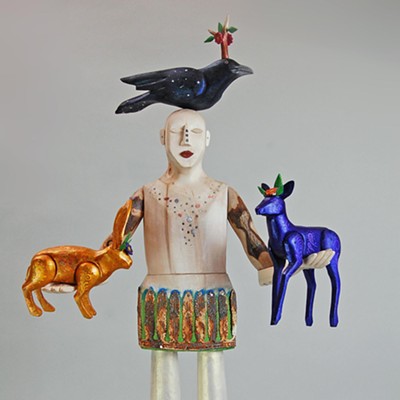The San Francisco duo, who copped their own name from a Joyce short story about a couple of cads, added to Crow Jane's lore on their debut album, The Throes, setting her on a path to Caledonia's legacy of multiple-song-inspiring Southern heartbreakers. Vivid and emotionally articulate, the Gallants' "Crow Jane" offers something like a prequel. Listening to it, you can understand why James had to put her in the ground: "Lips of honey but her tongue's of chalk. ... She took my money and left me in shock."
Turns out, all that was an accident. "I actually thought I'd come up with it myself," says Gallant Adam Stephens, vocalist, guitarist and songwriter; the other member is Tyson Vogel. "I learned about the old one later. Skip James gets credit for it, but the song is actually much older." Perhaps, like so many other early American ballads, it has its roots in Joyce's Ireland.
It's no accident, though, that this drums, guitar and harmonica outfit is playing music that has as much in common with James' music as, say Morphine's, or with Jimmie Rodgers' as the Amor Belhom Duo's, nor is it an accident that their stories have more in common with, say, Robert Johnson's than James Joyce's.
"I think of it as something pretty inevitable," Stephens explains. "I grew up listening to a lot of heavier music, like punk and things. That was cool ... but it doesn't really go very deep. ... Not that one is better, but I've always been kind of more attracted to storytelling. I wanted to actually say something, instead of like a sequence of random thoughts that are gathered together and don't really seem to give the whole picture.
"So I started listening to more traditional music, and once I did, it completely changed my approach to making music. I'm just in awe of songs where you feel like you know the person it's coming from, like old Doc Boggs songs about coal miners. The style of delivery and the content of the songs are so dry and straightforward, and it's almost like you're just sitting down talking to them."
Still, there's no mistaking Two Gallants for Delta-blues wannabes, mopey folkies or shoe-gazing singer-songwriters. Their sound evolved from an epiphany. "I just played your typical rock songs when I was growing up, and that was cool, but the way I learned to play right now happened around when I discovered John Fahey. His playing style completely blew my mind ... dirty, organic. It seemed very natural to me, like America, the countryside, like the heartland. That immediately changed the way I wanted to play guitar."
Fahey's radical passion, and the eccentric stew of his influences, ranging from Middle-Eastern, Indian and Eastern-European gypsy to antique American rural songs, avant-garde tone poems and psychedelia, marginalized his innovative music in the '60s. Still, he helped launch Leo Kottke's career, introduced the players who would become Canned Heat and led the music world to the then obscure bluesman Bukka White. He was nevertheless sick and destitute when Rhino released the highlights of his career in 1994 on Return of the Repressed. A student of Charlie Patton way before that was cool, Fahey died in 1997 at the age of 61 while working on a Patton retrospective. Two Gallants would have been in high school at the time.
Stephens and Vogel grew up together in San Francisco, attending the same private schools from the age of 5, but Stephens projects a sagacious empathy for Southern rural culture, a mystery akin to Gillian Welsh's uncanny affinity for the Appalachians. Stephens attributes his inspiration, predictably, to a literary influence. "I've always had this obsession with the South," he says. "Probably William Faulkner gets the blame for it." But classroom studies of the history of race relations in the South played a role as well. Stephens got caught up in the "deep rooted anger and racial tension there" and it hasn't let him go.
Tucsonans will experience one of the results of that focus among the new songs Two Gallants will perform here Oct. 6. Stephens says, "There's this one about a black sharecropper in the South, about his frustrations over the years and doing something about it in a fit of rage. I hope we do justice to the injustice."
Given the craftsmanship Stephens devotes to his lyrics, does he worry that the noisy, art-rock drama of the duo's musical accompaniment will obscure the stories? Stephens likes his guitar raw, direct and exciting, restrained only to emphasize the shifting moods of his songs' lyrics. Drummer Vogel's sticks don't so much play as dance and skitter across his skins and cymbals. He views the drums less as rhythm instruments than as means of communicating emotion. Their context for Stephens' craggy, soulful vocals is less a couch than a muted maelstrom. The combined effect is spellbinding.
"As far as me just putting energy into it or actual lyrical content, I don't think that one of them is more important than the other in any way," says Stephens. "I played pretty quiet acoustic shows for years by myself. The reason we started this was because that wasn't satisfying enough. People could listen to the songs and maybe get more out of the lyrics, but it didn't have that other half that was more powerful, that made you sit up and listen."
Two Gallants' Tucson appearance will focus on new material just recorded for January 2006 release. Stephen says the music has matured somewhat since the band's debut last year. "I like to think that the songs have grown from the first record," Stephens says. "They're all longer, which might be a bad thing. There's a lot more depth to the content and lyrics, and also in the playing. We really focus a lot on the songs.
One thing the new Two Gallants record won't have is a lot more players. While some might find the drums and guitar format limiting, Stephens and Vogel consider it ideal. Unfettered by the demands of incorporating more instruments, the pair has created their own, unique world of sound. Honing it on the streets at San Francisco's BART stations like a subtler, fog-bound Doo Rag, they've given it the same sort of space Spoke-era Joey Burns and John Convertino took from the desert. But the Gallants' space is cotton fields as far as the eye can see.
James Joyce meets Skip James--it's the sort of introduction you might expect from John Fahey.












